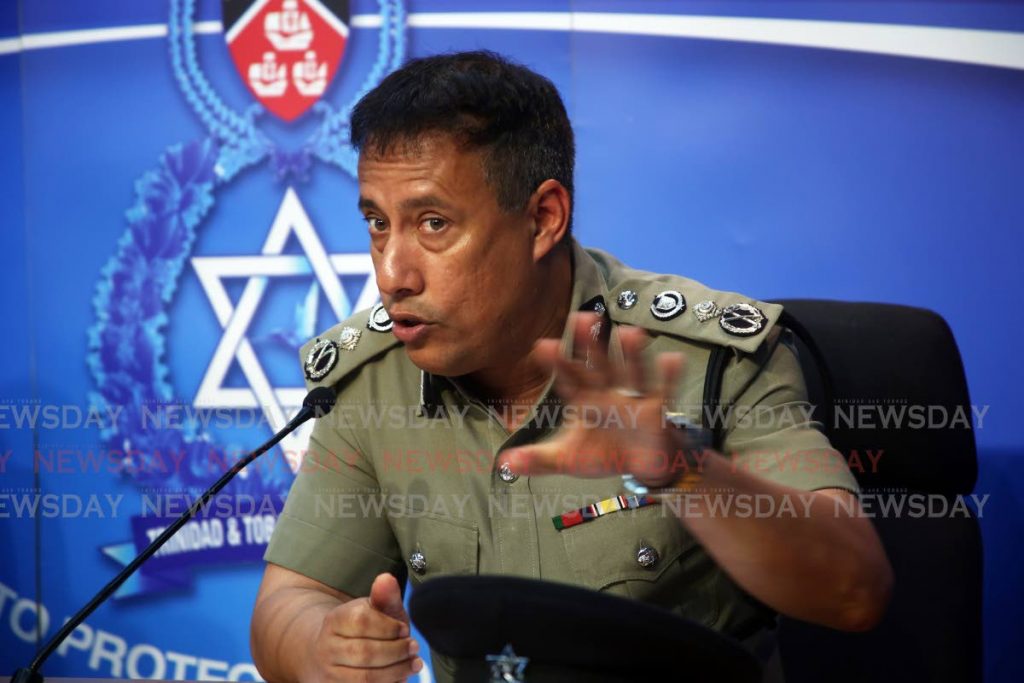CoP: Sedition arrests not witch hunts

Police Commissioner Gary Griffith has said while the police will continue to enforce all laws as best as they can, they will not be engaging in witch hunts under the Sedition Act.
Speaking with Newsday Tuesday afternoon, Griffith said there were various ways police investigated and dealt with seditious statements, citing the various intelligence units in the police service.
He said it was not necessary for someone to report suspected sedition.
"I can only speak about my tour of duty, but what we've realised is that the police can be aware of a possible criminal activity without someone making a report."
He said in the case of outgoing PSA President Watson Duke's arrest, no report was made and information on his allegedly seditious comments came from intelligence-gathering units.
"All of the different units, like the Cybercrime Unit, the Terrorism Intelligence Unit, the Special Investigations Unit – all of these different units will be continuously monitoring the situation, especially as it pertains to matters relating to national security.
While he could not reveal the details of the process behind investigating sedition, he said, the police did not continuously monitor media reports, as there were other ways to gather information to initiate an investigation.
"It's not that we spend every day looking to see what happens. Sometimes there are certain red flags that can be triggered that may alert law-enforcement agencies to take a closer look at statements.
"We don't go witch-hunting to monitor to see if people make statements so we can arrest and charge someone. This isn't a witch-hunting exercise, this is based on whether information comes to us – we will take a closer look."
He also said while he did not have an opinion on the argument over the Sedition Act's legality, he pledged to enforce the law once it remained on the books.
The sedition is described as any intention to incite hatred, contempt or disaffection of the government or constitution as illegal.
Over the past ten years, several people have been arrested, charged or investigated for making seditious remarks.
In 2005 Jamaat Al-Muslimeen leader Yasin Abu Bakr was charged for remarks made during an Eid Ul-Fitr service at his Mucurapo compound. These charges were dismissed after a seven-year-long trial ending in 2012.
In 2011 a Cocorite teen came under fire for allegedly threatening and making seditious remarks towards former prime minister Kamla Persad-Bissessar.
Former president of the Police Service Social Welfare Association Insp Michael Seales was arrested and charged for making seditious statements during a televised interview in 2015. These charges were also dropped in 2017.
Last November 22-year-old Jonathan Mohammed was arrested and charged for sedition and incitement to commit a terrorist act after he allegedly posted videos encouraging terrorist acts and civil unrest to his Facebook page.
In December 2018 opposition activist Devant Maharaj was criticised by the Prime Minister for releasing the phone numbers of government ministers, something National Security Minister Stuart Young said might qualify as seditious, as Maharaj's calls for protest action might have warranted criminal investigation.
Earlier this year leader of the Sanatan Dharma Maha Sabha Satnaryan Maharaj was investigated for alleged seditious statements he made during an episode of his show, the Maha Sabha Strikes Back, which led to a search of his Pasea, Tunapuna, radio studio by the police Special Investigations Unit, to find tapes of the recordings.
Maharaj, in turn, filed a lawsuit against the State over the police's refusal to disclose a warrant for the search.

Comments
"CoP: Sedition arrests not witch hunts"